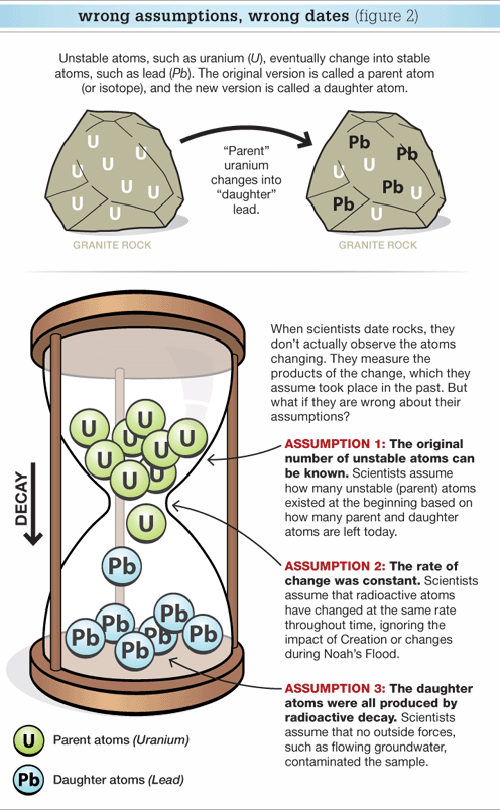
Q. When you add up the ages of Adam’s descendants from generation to generation, you get only a few thousand years to Jesus. The earth is much older than that, so the Bible is wrong!
A. The Bible as the Word of God is never wrong, and you can always trust the Bible. It’s man’s knowledge of the age of the earth that is faulty. When men start with evolutionary cosmology and geology as their basis, they invariably end up with wrong conclusions as the premises are wrong.
Let’s examine this question in two parts:
1. How does the Bible come up with the age of the earth and are there any flaws in the calculation?
2. What is the basis of claiming the earth is 4.5 billion years old and what’s wrong with this claim?
The Bible does not directly state that the earth is 6,000 years old, but if you add up the years in the genealogies of the Bible, you get approximately that age. Over the years a number of chronologists have done this, the most famous of which is Bishop James Ussher in the 17th century who determined that the world was created in 4004 BC:
Later critics who support uniformitarianism and believe that the earth to be ancient jumped on him, claiming his methodology to be unscientific, and that there are gaps in the genealogy which would throw off his calculations.
To the first charge our response is that Ussher did not use the scientific method to conduct experiments, instead he used the historical method which is valid for determining historical events and dates. In fact, no scientists were present to make observations when God created the universe. All they are doing now is to take measurements on some current processes such as radioactive decay, make assumptions about the starting conditions and the rate at which the process takes place, and infer the starting date based on those assumptions. We will show in our next post this had led to erroneous conclusions.
With respect to gaps in the genealogy, we need to know several things. First, how do we know gaps exist? Because elsewhere in the Bible it filled in the details. Otherwise, we would not even know as there are no secular family trees for us to compare. For example:
• Gen 11:10-12 This is the account of Shem’s family line. Two years after the flood, when Shem was 100 years old, he became the father of Arphaxad. And after he became the father of Arphaxad, Shem lived 500 years and had other sons and daughters. When Arphaxad had lived 35 years, he became the father of Shelah.
• Lk 3:35-36 the son of Serug, the son of Reu, the son of Peleg, the son of Eber, the son of Shelah, the son of Cainan, the son of Arphaxad, the son of Shem, the son of Noah, the son of Lamech.
According to Gen 11:12 Arphaxad was the father of Shelah. However, according to Lk 3:36, Arphaxad was the father of Cainan, who was the father of Shelah. Usually there are two reactions from skeptics – either there are gaps in the genealogies which can’t be used for dating purposes, or the Bible is full of inconsistencies and contradictions and can’t be trusted. Neither conclusion is correct when you understand that the Hebrew word for “father” is yalad, which means to bear (a child), bring forth, or beget. Similarly, the Greek word for “son” is huios, which means offspring, a descendant, or one of the posterity. In this case Arphaxad is the grandfather of Shelah, which is allowed by the language. And if the “gap” in one passage is filled in by another passage, is there still a gap? No, the blended genealogy would be complete. And there are no inconsistencies or contradictions.
Secondly, you need to distinguish between genealogy and chronology. The two are related but not the same. A genealogy may contain gaps when the author, in recording the descendants of a grandfather, jumped over the son and went straight to the grandson, as in the example above. However. there would be no gaps in the chronology. When the text said “when Arphaxad had lived 35 years, he became the father of Shelah”, the interpretation is that “Shelah was born when Arphaxad was 35 years old”, regardless of whether Shelah was the son or grandson of Arphaxad. Note that the genealogies in Gen 5 and 11 are also chronologies i.e. both the names and ages are given. Gen 5 gives the line from Adam to Shem, while Gen 11 takes it further from Shem to Abram. So between the two you have the chronology from Adam to Abram, from 4004 BC to 1996 BC according to Ussher, with no gaps in between.

Are there flaws in Ussher’s calculation? Not logically. His methodology of cross-referencing all relevant bible passages, and correlating biblical events to archeology and history, is mathematically sound. Small differences arise depending on which version of the Bible you use. Ussher used the Masoretic text of the Hebrew OT. Others used the Septuagint LXX version of the Greek OT and come up with 5490 BC as the year of Creation, with the earth at approx. 7,500 years old. Many other chronologists have attempted to redo the arithmetic, using more recent archeological discoveries as reference points, but all come up with similar results dating the age of the earth to between 6-14,000 years old, a far cry from the 4.5 billion years popularized by evolutionary biologist and geologists.
[To be continued]








